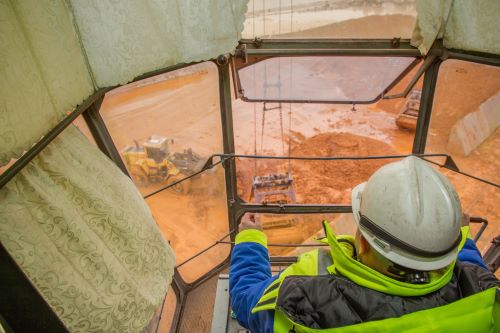
5 Skills Every Crane Operator Must Learn

If you’re considering starting a career as a crane operator, there are certain skills necessary for you to build life-long career opportunities within the construction industry. Crane operation requires mechanical knowledge as well as effective communication on the jobsite. With the proper tools, you can secure a challenging and rewarding job that utilizes your specialized skills. If you can visualize yourself directing cranes on a jobsite, then it might be time to consider a career as a crane operator. Read below for a guideline on what skills you will need to begin your career.
1. Workplace Safety
Jobsites are dangerous, but most injuries are preventable. As a crane operator, you must be able to check for and secure work safety for yourself and others. This includes personal safety as well as equipment safety. An intrinsic aspect of the job is heights. To ensure safety, you’ll need to know about fall prevention while climbing towers or working from equipment with elevated cabs. You must also know how to properly set up cranes, inspect the equipment, follow proper operating methods, and correctly read load charts so your crane has a safe workload.
2. Understand Load Charts
Each crane has a load chart detailing the crane’s capabilities. It outlines the crane’s specifications and what it’s capable of lifting. In order to ensure crane safety, it’s important that every crane operator understands how to read a load chart. It will also ensure that you have the correct amount of lift capacity for the job. The load chart will help you determine lift capacity, lift range, lift angle, as well as lift capacity for a crane in motion. Knowing these specifications will determine if a crane can do the work safely and effectively.
3. Troubleshoot Equipment
There are many different types of cranes. Being able to operate and troubleshoot multiple types of cranes is an important skill. A skilled operator must know how to set up the various cranes as well as how to use different attachments and lifting techniques. The more you know, the more employable you are.
West Coast Training has a variety of cranes and ample equipment so you have as much individual practice time as necessary. We work with students to make sure they have enough experience with the machinery before entering the job market. Our heavy equipment certifications will help you increase your earning potential as you look to land your desired job.
4. Effective Communication
Communicating effectively with other operators on a jobsite is essential. A crane operator must be able to follow and give precise instructions. This is especially true if you’re a rigger or signalperson. These jobs require clear communication with others so you can get the job done with efficiency and safety.
5. Interview Ready
Crane operators must not only know how to operate machinery but how to present themselves to a future employer. This entails having a resume and interview that catches their attention. You may need to refine your resume and practice your interview skills so you feel comfortable talking to a prospective employer.
Once you’ve learned the necessary skills and have improved your resume, you will be ready to begin a successful career in construction.
